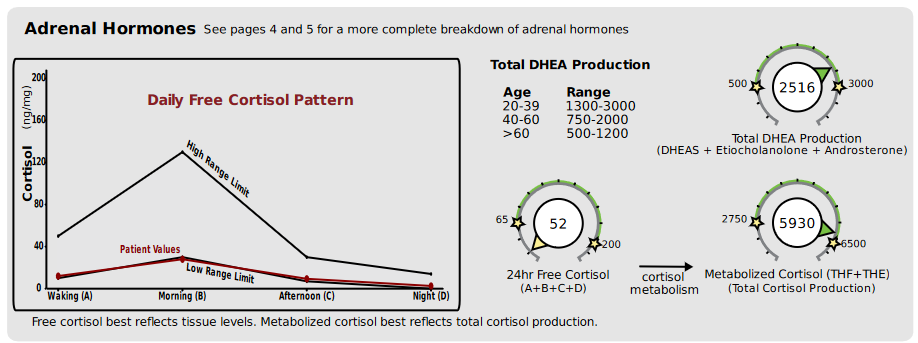DUTCH Test (Dried urinary test for comprehensive hormones)
DUTCH – Dried Urine Test for Comprehensive Hormones
This advanced hormone testing was developed to improve on available hormone testing options.
DUTCH offers the most extensive profile of sex and adrenal hormones along with their
metabolites. Additionally, the daily (diurnal) pattern of free cortisol is included, along with melatonin
(6-OHMS), 8-OHdG, and six organic acids. This unique combination of clinical information is not
available by any other method.
The results include:
- Extensive Estrogen Metabolites: E1, E2, E3, 2-OH-E1, 4-OH-E1, 16-OH-E1, 2-Methoxy-E1, 2-OH-E2, 4-OH-E2
- Extensive Androgen Metabolites: Testosterone, DHEAS, DHT, and more (7)
- Progesterone Metabolites: b-Pregnanediol, a-Pregnanediol (2)
- Graphical representation of results
- Provider notes with specific additional information created specifically for the patient
The DUTCH Plus® takes hormone testing to a whole new level. In addition to sex hormones and their metabolites, the DUTCH Complete™ looks at the overall diurnal pattern of free cortisol, and the total and distribution of cortisol metabolites. The DUTCH Plus® adds the Cortisol Awakening Response (CAR) to bring another important piece of the HPA-axis into focus.
What is the Cortisol Awakening Response and how do we test for it?
When we open our eyes upon waking, cortisol levels naturally begin to rise by an average of 50%. 30 minutes after waking, cortisol levels will still show this sharp increase. By 60 minutes after waking, cortisol levels have peaked and begin to decline. Measuring this rise and fall of cortisol levels at waking can be used as a “mini stress test”. Research shows that the size of this increase correlates with HPA Axis function, even if the sample measurements are all within range. A quick saturation of saliva swabs upon waking, and at 30 and 60 minutes after waking, provide what is required to assess a patient’s Cortisol Awakening Response.
A low or blunted Cortisol Awakening Response
This can be a result of an underactive HPA Axis, excessive psychological burnout, seasonal affective disorder
(SAD), sleep apnea or poor sleep in general, PTSD, chronic fatigue, and/or chronic pain. A decreased CAR has also been associated with systemic hypertension, functional GI diseases, postpartum depression, and autoimmune diseases.
An elevated Cortisol Awakening Response
This can be a result of an over-reactive HPA Axis, ongoing job-related stress (anticipatory stress for the day), glycemic dysregulation, pain (i.e. waking with painful joints or a migraine), and general depression (not SAD). A recent study showed that neither the waking nor post-waking cortisol results correlated to Major Depressive Disorder, but the CAR calculation (the change between the first two samples) did. This measurement of the response to waking has independent clinical value showing dysfunction that may be hidden by current testing options.
What can the DUTCH Plus® tell us that the DUTCH Complete™ cannot?
Even though a patient may have “normal” free cortisol levels throughout the day, that doesn’t always mean everything is functioning properly. The graph below shows two good examples. A blunted or exaggerated Cortisol Awakening Response (CAR) can appear, even when single samples return “normal” results. The HPA axis might not be appropriately responding when faced with a stressor, even when cortisol levels are fluctuating nicely throughout the day. The “stress” of waking allows us to test the HPA axis in a way that has been independently correlated to clinical outcomes and cannot be assessed by other cortisol tests on the market.


